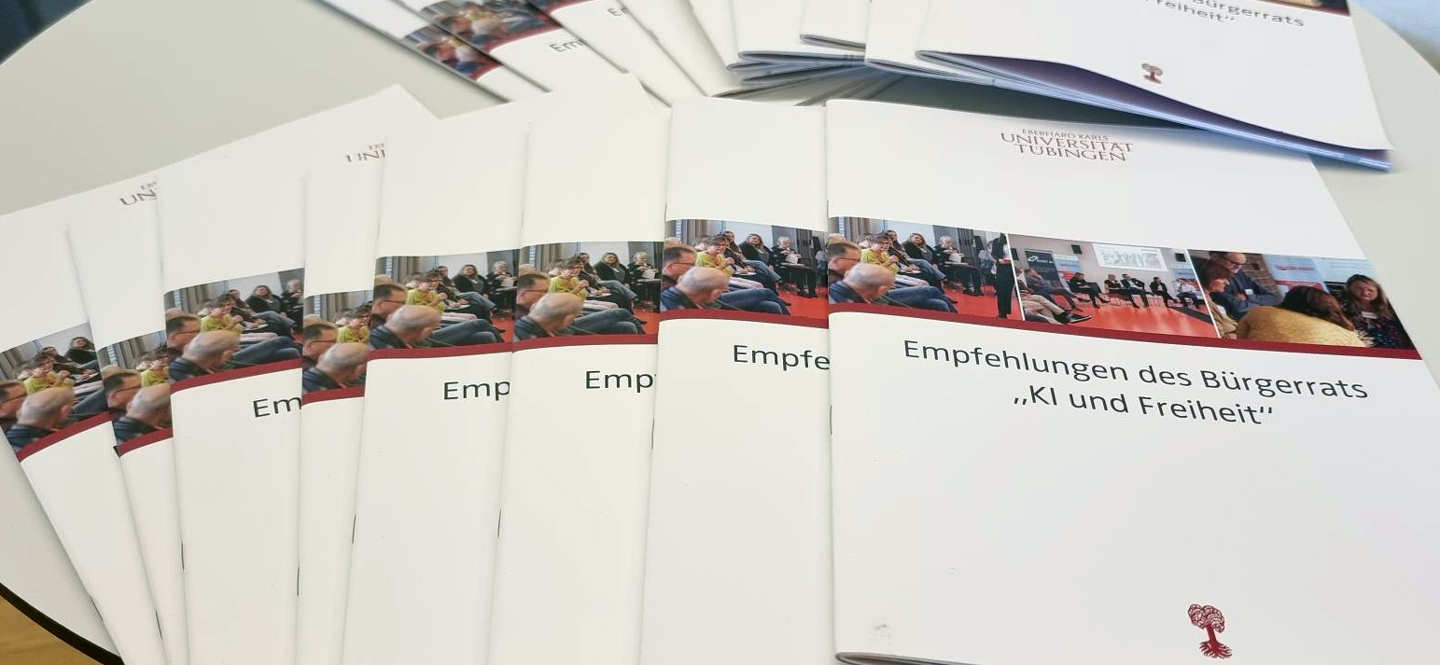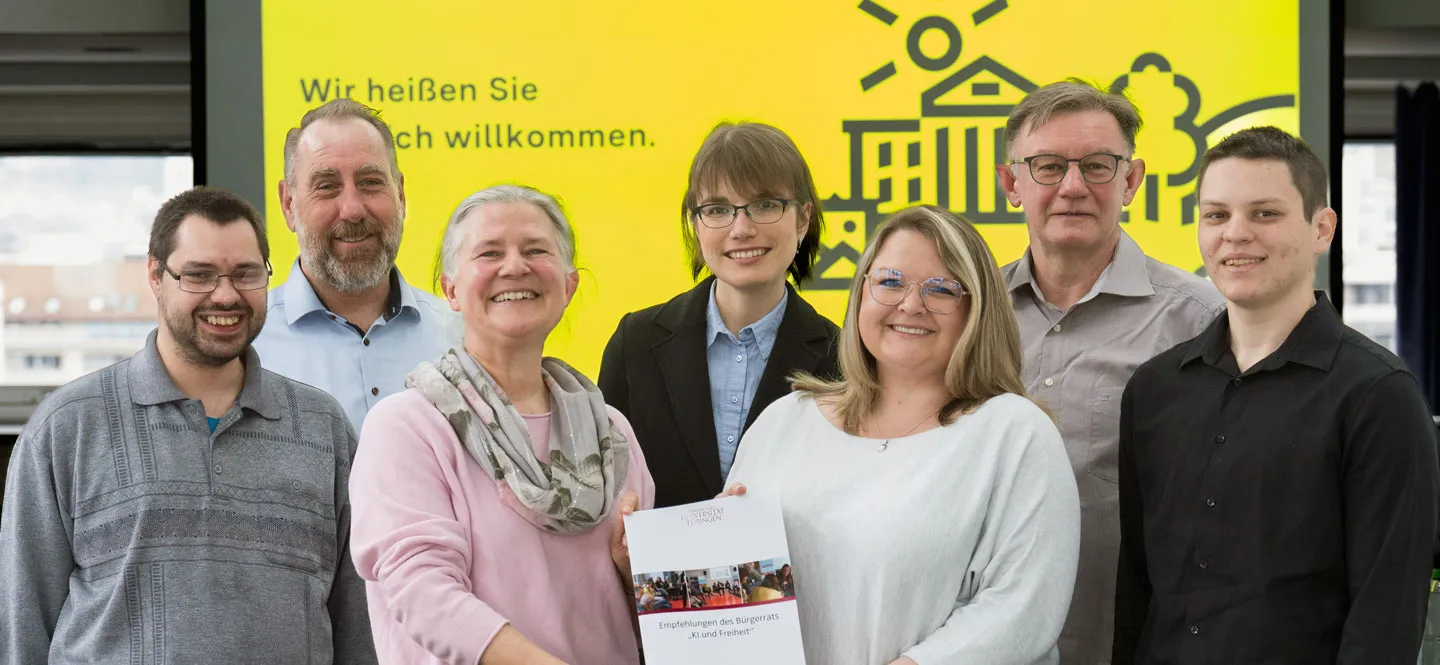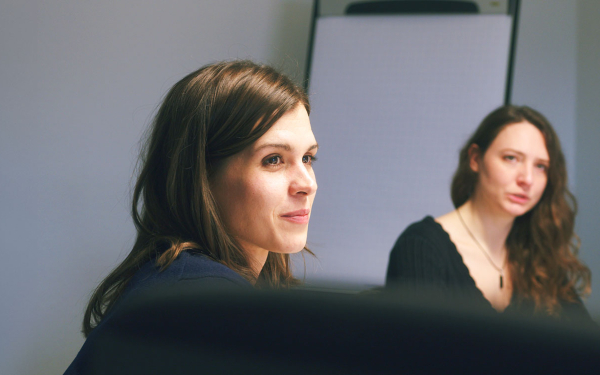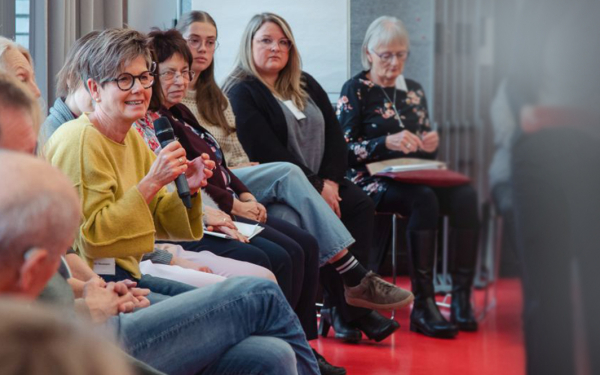Finally having a say on AI - insights into the Citizens' Assembly "AI and Freedom"
#Artificial Intelligence
Have your say on artificial intelligence and help shape the future of research on the topic. Forty randomly selected citizens from Baden-Württemberg have set themselves this task. They came together over a period of several months in the Citizens' Council called ‘Artificial Intelligence and Freedom’.
The Citizen´s Council was set up by the Center for Rhetorical Science Communication Research on Artificial Intelligence (RHET AI), funded by the Volkswagen Foundation. The project shows that you can also discuss complex topics in a respectful manner with citizens from outside the academic community.
We spoke to three participants. They all live in small towns in Baden-Württemberg. Robin Schleser, in his early 20s, is researching the use of AI in the SAP environment at a company in Munich. Rainer Hellberg, soon to be 80, has worked in export for a long time and has had little practical contact with the topic. Isabelle Rienhardt, 46, works as a travel agent and is worried that AI could eventually replace her.
In summer 2024, you found a letter in your post box inviting you to join the Citizens' Council AI. Your first thoughts at the time?
Robin Schleser: For real? At first, I thought someone was taking the mickey (laughs). I work as a programmer at SAP. And the letter said that I was chosen by chance. But then I looked into it and decided to accept.
Rainer Hellberg: I'm the oldest member of the group. I'm retired and will soon be 80. I used to work in export, travelled all over the world, still travel a lot and am very interested in politics and business. I've often made very sage remarks about AI without ever knowing what it actually is (laughs). I thought: Rainer, you could really learn something.
Isabelle Rienhardt: I sometimes use AI in everyday life, for ChatGPT, for example. When the invitation came, I thought: Yes, why not just have a look, what is it anyway?

Lively discussion at a meeting of the Citizens' Council "AI and Freedom".
There was a preliminary discussion, four meetings on Saturdays, plus follow-up work. Did you have to think long and hard about whether you wanted to take part?
Hellberg: For me, it sometimes meant several hours of travelling. But that didn't stop me. Before the first meeting, I spoke to my sons and learned that they had both been working with AI professionally for around 10 years. And they also said: Yes, why don't you take part? That's interesting. So that's what I did.
Schleser: I am one of the youngest and work with AI every day. I found it interesting to see how others look at it who don't work for a software company or grew up with it like me. And I naturally wanted to contribute what I can.
You met for the first time in September 2024, in the AI Research Building at the University of Tübingen. With such different backgrounds, how did you manage to talk to each other about AI?
Hellberg: The first session revealed quite a lot of shared ignorance.
Schleser: Yes, and then there were four hours of input on AI. This basic knowledge proved to be enough for us all to talk to each other.
In society, it is becoming increasingly difficult to engage in respectful dialogue with one another. Did you have lengthy discussions about how you wanted to deal with content?
Rienhardt: The team had set out a catalogue of rules, which we discussed together, and we were able to get involved, but it was a good fit – it was simply about basic issues such as respect, letting people finish, allowing different opinions.
How can we imagine the atmosphere at the meetings?
Hellberg: The atmosphere was very respectful, actually always positive, even when we didn't agree. Nobody was talked down to or ignored or not taken seriously. There was a great deal of mutual respect.
Rienhardt: Yes, there was a great atmosphere in the group.

Members of the Citizens' Assembly at the presentation of the policy paper "Recommendations of the Citizens' Assembly on AI and Freedom".
What did a typical session look like?
Hellberg: Small groups were repeatedly formed at different tables. Sub-topics and questions were then dealt with in the groups.
Rienhardt: We then put the most important points up on the wall as stickers so that the others could read them, discuss them again and add to them.
Schleser: And then a journalist helped us to finalise the content at the end of the meetings. This draft from the editorial group was then sent back to the larger group by email. In the end, the policy paper came out.
Everyone knows it from coalition negotiations. Sometimes every word is fought over. How did you deal with it in the group when individuals had different opinions – it’s hard to believe there was always consensus on every sentence in the paper.
Hellberg: If we didn't agree, we simply recorded the ‘dissenting votes’, the alternative formulations we wanted. However, we found ourselves more or less in agreement on most issues.
AI will change the lives of many people. Was there any place for emotion at the meetings?
Rienhardt: There was certainly room for concern. Sooner or later, AI will probably become even more prevalent in my job, and the profession is quite likely to die out – such changes are imminent in many industries. But I've not yet heard anyone say: My God, it's all going to be bad.
Which topic area within AI have you discussed particularly intensively?
Schleser: That was the topic of health and AI. We actually agreed that if we can use anonymised health data to reduce the burden on our German medical system and make it cheaper and more efficient, then there really is potential. But many people were worried about access to sensitive data. That's why we also formulated the demand in the paper to establish an infrastructure for secure data donation.
You presented a policy paper to the Minister of Science of Baden-Württemberg. What is the best way to describe the paper?
Robin Schleser: These are recommendations (pdf) for action from the middle of society. We cannot make any demands about how basic research should change in terms of content – but we wanted to contribute our thoughts that come from many different backgrounds. Especially where researchers may sometimes have more of a tunnel vision.
Mr Schleser, you were also present at the handover to the Minister. How did you feel about that?
Schleser: To be honest, the part with the speeches was rather stiff (laughs) – and we didn't have much time to present our results. But in the following discussion, the talks, that was valuable because many staff from the ministry were also there and because the essence of the Citizens' Council really came across.
Hellberg: Yes, Robin, but if I put that in relation to our meetings, which probably lasted half a year or five months, with input from 40 people and the intensive contribution from the university team, then dealing with a few key points in just 20 minutes doesn’t seem very much. That disappointed me a little.
Rienhardt: It has to be said that the minister took an hour of her time at a meeting beforehand.
Schleser: That's right. And she was really very close to the topic, that really impressed me.
And what happens now for the topics brought up by the Council and the Council itself?
Schleser: The Minister said that the state government has already initiated a number of things in respect of topics such as the MEDI:CUS Cloud, which is intended to simplify the exchange of healthcare data, and she feels vindicated. But there is no concrete plan to start something new with our recommendations or to focus more strongly on them.
Rienhardt: There is certainly still room for potential to give people from a citizens’ council like ours more of a voice, to show them what happens to their work, who looks at it and in what context, and how it continues. It would be nice if this didn't just remain a one-off round with a few meetings. If there was a way to bring the topic and its challenges closer to others – in whatever format – I would be happy to be involved.
How has your work on the Citizens' Council influenced your conversations with family or friends?
Hellberg: I have two regular meetups with people my age who have been retired for a long time. I've met with a lot of interest there – because of the Citizens' Council in general, but also in terms of content. I've also told my granddaughters about it and realised that, despite the knowledge I've acquired, they're already much further along than I am (laughs).
What do you take away from the Citizens' Assembly AI?
Hellberg: I was impressed by the atmosphere: 40 people with sometimes very contrary opinions, with different knowledge and a great deal of scepticism at the beginning. How we managed to have a focussed discussion and find results – respect.
Rienhardt: People in politics could certainly learn a thing or two from this: discussing, finding results away from black-and-white thinking, without focussing on attacks on the other side.
Schleser: I have also overcome prejudices. Beforehand, I already had it in my head that older people don't really get to grips with technology. But some of the older people in the group were better informed about AI than the younger members of the group.
Hellberg: For me, our group also showed that we need to reach out to young people with the important issues in society. You can no longer do that via television. We have to find new channels, other ways – and a citizens' council can be one way.


